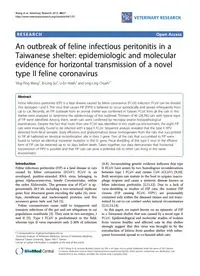
2013 An outbreak of feline infectious peritonitis in a Taiwanese shelter_ epidemiologic and molecular evidence for horiz PDF
Preview 2013 An outbreak of feline infectious peritonitis in a Taiwanese shelter_ epidemiologic and molecular evidence for horiz
RESEARCH Open Access An outbreak of feline infectious peritonitis in a Taiwanese shelter: epidemiologic and molecular evidence for horizontal transmission of a novel type II feline coronavirus Ying-Ting Wang1, Bi-Ling Su2, Li-En Hsieh1 and Ling-Ling Chueh1* Abstract Feline infectious peritonitis (FIP) is a fatal disease caused by feline coronavirus (FCoV) infection. FCoV can be divided into serotypes I and II. The virus that causes FIP (FIPV) is believed to occur sporadically and spread infrequently from cat to cat. Recently, an FIP outbreak from an animal shelter was confirmed in Taiwan. FCoV from all the cats in this shelter were analyzed to determine the epidemiology of this outbreak. Thirteen of 46 (28.2%) cats with typical signs of FIP were identified. Among them, seven cats were confirmed by necropsy and/or histopathological examinations. Despite the fact that more than one FCoV was identified in this multi-cat environment, the eight FIP cats were invariably found to be infected with a type II FCoV. Sequence analysis revealed that the type II FIPV detected from fecal samples, body effusions and granulomatous tissue homogenates from the cats that succumbed to FIP all harbored an identical recombination site in their S gene. Two of the cats that succumbed to FIP were found to harbor an identical nonsense mutation in the 3c gene. Fecal shedding of this type II virus in the effusive form of FIP can be detected up to six days before death. Taken together, our data demonstrate that horizontal transmission of FIPV is possible and that FIP cats can pose a potential risk to other cats living in the same environment. Introduction Feline infectious peritonitis (FIP) is a fatal disease in cats caused by feline coronavirus (FCoV). FCoV is an enveloped, positive-stranded RNA virus belonging to genus Alphacoronavirus, family Coronaviridae, within the order Nidovirales. The genome size of FCoV is ap- proximately 28.9 kb, including a non-structural replicase gene; four structural genes encoding the spike (S), enve- lope, membrane and nucleocapsid proteins; and five accessory genes 3abc and 7ab [1]. Feline coronaviruses cause mild to inapparent and transient infections of the gut and are ubiquitous in cat populations worldwide [2]. They exist in two serotypes, I and II [3]. Type I FCoV is predominant in the field, whereas type II virus represents only 2-30% of infection [4-8]. Accumulating genetic evidence indicates that type II FCoV have arisen by two homologous recombinations between type I FCoV and canine CoV (CCoV) [9,10]. Both serotypes can mutate in the host to acquire macro- phage tropism and cause a systemic disease known as feline infectious peritonitis [2,11,12]. Due to a lack of virus-shedding in studies of FIP cats, the mutant FIP viruses (FIP causing FCoV, FIPV) are presumably contained only within the diseased tissues and not trans- mitted by cat-to-cat contact under natural circumstances [2,11,13,14]. In this paper, we report herein on an epizootic of FIP in a Taiwanese shelter that was caused by a novel type II FCoV. Epidemiological and molecular studies of isolates from various healthy and affected cats in this shelter strongly suggest that this virus was brought in by the introduction of kittens from another shelter with subse- quent horizontal spread to co-housed adult cats. * Correspondence:
